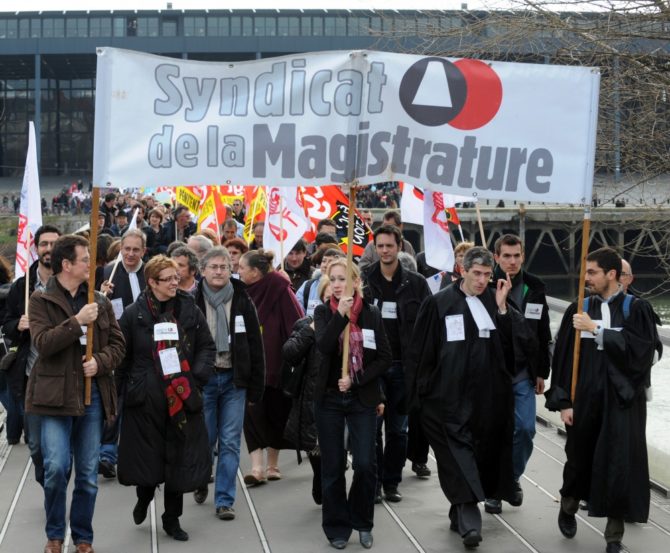The French-American Foundation Weekly Brief

French President Nicolas Sarkozy is facing a nationwide strike by the country’s magistrates, who are outraged at his claim that their incompetence allowed a repeat sex offender to allegedly murder and dismember a teenage girl near the town of Pornic in western France last month in a case that made national headlines. According to the Daily News, Sarkozy said that “serious dysfunctions” in the police and judicial services had led to the suspect’s release without proper supervision. Judges took to the streets in dozens of French cities and were joined by prison officers and police unions. Judges say they lack the funding and personnel necessary to carry out their work and have accused the French president of using the case to boost his “tough-on-crime” image ahead of the presidential race next year, according to the Guardian. A recent study found that the budget allocations to courts in France rank 37th out of the 47 countries making up the Council of Europe. A study conducted this week showed that 65 percent of French people supported the manifestations of French magistrates, according to Le Point.
President Nicolas Sarkozy told his ministers on Wednesday, February 9, to “prioritize France” in planning vacations as two ministers have now come under fire following reports that they took vacations in nations now ridden with unrest at the expense of heavily protested autocratic leaders, the AP reported. After Foreign Minister Michèle Alliot-Marie has spent weeks defending herself after reports surfaced that she accepted two rides aboard private jets affiliated with since-ousted president Zine el Abidine Ben Ali of Tunisia, Prime Minister François Fillon took his turn in the spotlight of scrutiny this week after it emerged that he accepted accommodation, a Nile tour, and the use of an Egyptian state airplane during his family vacation to Egypt from December 26 to January 2, according to the Guardian. During that visit, Fillon met with President Hosni Mubarak, who became the focus of mass protests inspired by those that led the Tunisian leader to flee to Saudi Arabia. In a statement released following the cabinet meeting on Wednesday, Sarkozy said all future foreign vacations by ministers would have to be approved first by the prime minister (Fillon himself) and the president’s diplomatic office, according to the Financial Times. AFP explored how France’s new fascination with the funding for the foreign vacations of its leaders, a long tradition overlooked by the French people, has proven the first black spot in the career of Fillon, who was named Politician of the Year in 2010.
French President Nicolas Sarkozy backed a “competitiveness pact” presented by German Chancellor Angela Merkel at a Brussels Summit of European leaders on Friday, February 4, the Wall Street Journal reported. The plan proposed an unprecedented level of integration between European economies, harmonizing tax and expenditure policies, setting a Union-wide retirement age at 67, and establishing Brussels as the overseer of wage bargaining, according to Foreign Policy. The stricter regulation of EuroZone nations’ financial policies comes as a compromise on the part of Merkel, who has eased her reluctance to provide economic support to faltering economies, such as the bailout packages delivered to both Greece and Ireland in the last year, according to the Washington Post. While France and Germany, who historically have held the greatest sway in EU policy, have supported the plan, various nations have shown opposition to particular stipulations presented as part of the plan.
Government spokesman François Baroin said on Wednesday, February 9, he was confident about France’s chances of selling Rafale fighter jets produced by French Dassault Aviation to Brazil, according to Reuters. The announcement came the day after Brazilian President Dilma Rousseff said on Tuesday, February 8, in an interview with American Treasury Secretary Timothy Geithner, that she preferred the F-18 fighter jet produced by Boeing, while Brazil’s military has voiced a preference for the Swedish Gripen model, according to Le Point. The issue dates back to 2008, when Sarkozy announced a possible, at the time announced as probable, deal after meeting with Rousseff’s predecessor Lula da Silva. Since, the Brazilian army and leaders seem to have lost interest in French aviation technology. A testimony to the Defense Committee of the National Assembly by Dassault CEO Charles Edelstenne, which was released on Wednesday, February 9, asserted that the French aircraft manufacturer was in discussion with eight prospective buyers, according to Bloomberg. While Edelstenne said that 75 percent of sales of its discontinued Mirage fighter jet came from foreign sales, Dassault has yet to sell a Rafale, its newest fighter-jet model, to a foreign nation, while the French military has committed to the purchase of 268 Rafales. In 2007, Dassault lost a contest to sell fighter jets to Morocco.
Share to: Facebook Twitter LinkedIn Email
Leave a reply
Your email address will not be published. Required fields are marked *



